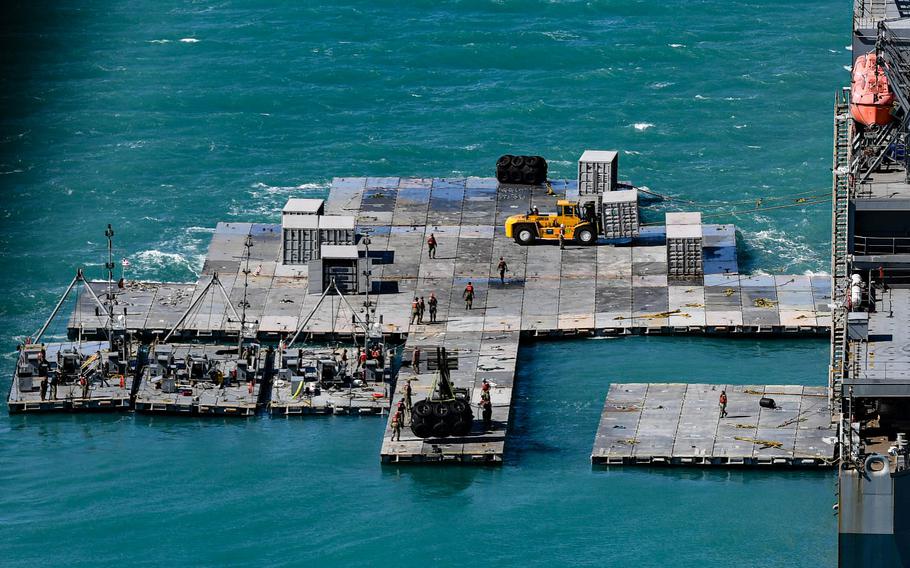
Army mariners work to construct a causeway known as Joint Logistics Over-the-Shore, or JLOTS, off the coast of Bowen, Australia, in 2023. U.S. officials plan to use JLOTS in the coming weeks to move aid into war-torn Gaza. (David Resnick/U.S. Army)
Construction has yet to start on a temporary floating pier off Gaza’s coast, but the Pentagon expects it will be ready to flow new aid into the war-torn Palestinian enclave in the coming weeks, the Defense Department’s top spokesman said Tuesday.
All the Army and Navy troops needed to build the temporary dock and an about 1,800-foot floating causeway from the Mediterranean Sea into northern Gaza have arrived in the region, Air Force Maj. Gen. Pat Ryder told reporters at the Pentagon. Even with construction of the makeshift port — known as a Joint Logistics Over-the-Shore, or JLOTS — not started, Ryder said the Pentagon was confident it would be operating “by the end of this month or early May.”
The operation is meant to provide a new way to deliver badly needed aid into Gaza. The World Health Organization has warned some 2.3 million inhabitants face extreme hunger that could become a full-blown famine by next month amid the war launched by Israel in response to Hamas militants’ surprise Oct. 7 assault on Israelis.
Ryder has said the JLOTS operation could deliver some 2 million meals per day to Gaza.
“All the necessary vessels are within the Mediterranean region and standing by … to begin construction when we’re given the order to do that,” he said. “There is a process and procedure that will have to be followed … and our planners have worked through the details of all the things one would expect [but] we’re on track at this point to implement that operational capability” in the coming weeks.
Ryder did not say Tuesday precisely how long it would take troops to build the port once construction begins.
President Joe Biden first announced the JLOTS operation would begin to bolster U.S. efforts to deliver aid to Gazans on March 7 during his State of the Union speech. One day later, Ryder said the JLOTS would be operational within about 60 days.
The Army last month sent four ships from the 7th Transportation Brigade at Joint Base Langley-Eustis, Va., toward the Mediterranean to spearhead the operation. The Navy also deployed two ships to help in the construction of the pier. One of those ships, the USNS 2nd Lt. John P. Bobo was forced to return to the United States last week after suffering an engine room fire.
That incident does not appear to have altered the Pentagon’s planned timeline for the pier’s construction, according to Ryder on Tuesday.
Ryder also said while U.S. Navy boats would help shuttle aid from the pier “several miles offshore” to the causeway, only nongovernmental organizations were expected to deliver aid packages into Gaza via “non-military trucks.” The Pentagon has insisted U.S. military forces would not set foot in Gaza as part of the operation, and it has turned to the Israeli Defense Forces to ensure security of the aid operation.
The operation is expected to include about 1,000 American troops.
Ryder said the new port would be able to accept military and civilian ships carrying aid once it is operational.